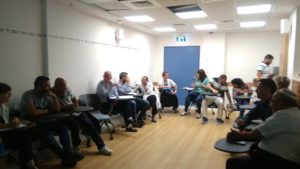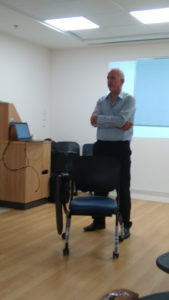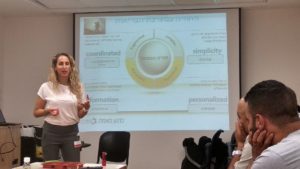Cultural Competency Renewing Skills at Sha’are Zedek
In recent years, we, together with the Shaare Zedek Medical Center, have organized two training courses in medical interpreting. Both courses were joined by bilingual workers and volunteers from Hadassah and ALYN hospitals.
It is very important for Sha’are Zedek to maintain the interpreters’ professional skills, who are called on to translate and interpret patient encounters, in addition to their daily work, sometimes several times a day. Therefore, these professional development days are organized, not only to give them additional skills and updates, but also as a way to appreciate their work.
In late June we held a meeting that was attended by interpreters who speak Arabic, Russian, Amharic and French.
We started the day with a discussion about advanced technological tools (artificial intelligence) that can help medical interpreters, and the biggest question of all – can a robot replace the medical interpreter? The answer right now is – absolutely not. Artificial Intelligence experts have made great progress in developing automatic translation tools, or tools to assist interpreters during work (currently for conference interpreters only). But these tools are not yet designed to deal with the unique features of medical interpreting – silence, repetition, a great deal of emotion, slang, various dialects and more. Not to mention complex situations and ethical dilemmas (the husband does not want the interpreter to translate into a wife, for example).
In short – artificial intelligence technologies for translating human languages are getting better every day. What looks like science fiction today will probably be a reality in a year. These tools will not replace human medical interpreters, but it is important to follow the developing technologies to see how we can improve the quality of medical interpretation, without fear of being replaced by robots.
Afterward, Shweki Majed, a hospital employee who is also a regular interpreter and who has taken several interpreting courses, shared with the newer interpreters how interpreting changed him personally and professionally. He told stories openly and honestly of dilemmas he encountered. Here’s an amusing story – One day, as part of his job as an interpreter he translated in the first/ second person, as advised in the training (“you should take the medicine” instrad of “the doctor tells you to take the medicine). Afterward, the patient insisted that he was the doctor, and not the actual doctor. After a few months, they met again at a family event and the person again insisted he was the doctor who treated them. No explanations helped …
Ms. Vered Huber – Machlin, Director of the hospital’s Physical Therapy Department, was the third speaker. She has studied the field of patient experience. The health system and physicians are often focused on the illness, and she is bringing the field of medical interpreting to a patient-centered treatment regime – how the disease affects him, his concerns, the basic information he needs to receive, and ways to get him involved in the treatment. She talked about the interpreter’s unique role in this context, as well as its limits.
Many thanks to everyone who organized this wonderful day, and especially to Tali Arazi and Efrat Cohen.
And of course, many thanks to the Jerusalem Foundation, for its continued support of Cultural Competency over the past decade.



